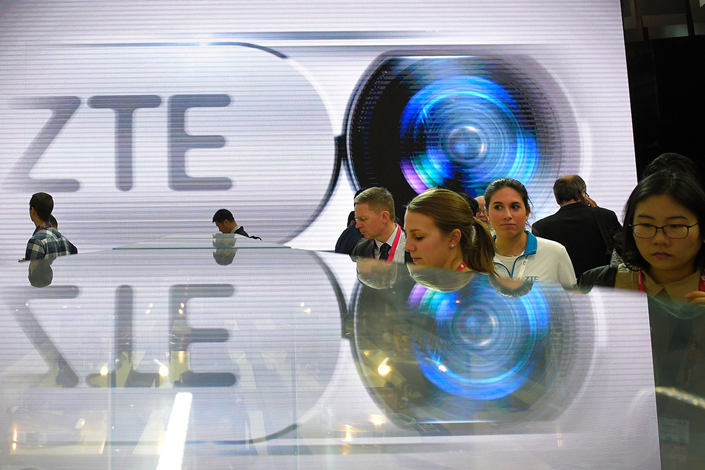ZTE Hit by 7-Year U.S. Ban on Tech Exports

* The denial of export privileges will block American companies from selling components to ZTE
* Shares of U.S. optical-component companies plunged following the announcement
The U.S. Department of Commerce banned Chinese telecom equipment maker ZTE Corp. from buying components from America suppliers for seven years amid brewing trade tensions between the world’s two biggest economies.
The commerce department said Monday that it imposed a “denial of export privileges” order against ZTE. The department alleged that ZTE made false statements to U.S. officials and violated a previous settlement of criminal and civil charges for making illegal shipments to Iran and North Korea.
The denial of export privileges will block American companies from selling components to Shenzhen-listed ZTE, one of China’s largest telecom equipment makers.
Shares of U.S. optical-component companies plunged following the announcement. Nasdaq-listed Acacia Communications Inc., which gets about a third of its revenue from ZTE, tumbled over 35% in a record decline, according to Bloomberg data. Oclaro Inc., another major supplier of ZTE, lost over 14% in early trading.
In March 2017, ZTE agreed to pay as much as $1.2 billion in fines over allegations that it illegally sold U.S.-made equipment to Iran and North Korea in violation of U.S. sanctions aimed at punishing those countries over nuclear development programs.
In addition to the fines, ZTE agreed to a suspended seven-year denial of export privileges. That penalty was to be activated if ZTE failed to implement a new compliance program and to punish the employees involved or if the company committed additional violations, according to the department.
The commerce department said Monday that ZTE made false statements to its Bureau of Industry and Security (BIS) in 2016 and 2017 during settlement negotiations and the probationary period “related to senior employee disciplinary actions the company said it was taking or had already taken.”
These false statements covered up the fact that ZTE paid full bonuses to employees who had engaged in illegal conduct and failed to issue letters of reprimand, according to the commerce department.
“ZTE misled the Department of Commerce,” said Commerce Secretary Wilbur Ross. “Instead of reprimanding ZTE staff and senior management, ZTE rewarded them. This egregious behavior cannot be ignored.”
The U.S. ban came on the same day that the U.K.’s cyber security watchdog warned the country’s telecom providers not to use network equipment or services from ZTE, citing national security risk.
ZTE makes networking equipment used by enterprises and telecom carriers as well as consumer products like smartphones. It has struggled in recent years in the face of stiff competition in the global smartphone market and low margins for its networking equipment sales mostly in developing markets.
Contact reporter Han Wei (weihan@caixin.com)

- 1Cover Story: China Carves Out a Narrow Path for Offshore Asset Tokenization
- 2Drownings Shake Chinese Enthusiasm for Travel to Russia
- 3Over Half of China’s Provinces Cut Revenue Targets
- 4Li Ka-Shing’s Port Empire Hit by Forced Takeover Amid Panama Legal Dispute
- 5In Depth: China’s Mutual Fund Industry Faces Overhaul After a Banner 2025
- 1Power To The People: Pintec Serves A Booming Consumer Class
- 2Largest hotel group in Europe accepts UnionPay
- 3UnionPay mobile QuickPass debuts in Hong Kong
- 4UnionPay International launches premium catering privilege U Dining Collection
- 5UnionPay International’s U Plan has covered over 1600 stores overseas





